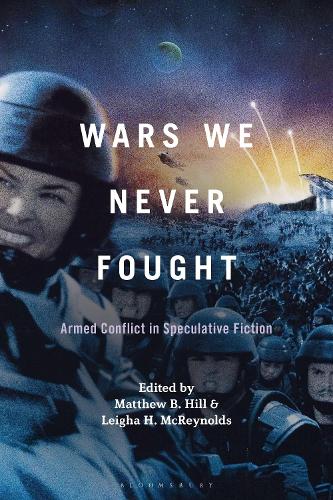
Wars We Never Fought: Armed Conflict in Speculative Fiction
(Hardback)
Publishing Details
Wars We Never Fought: Armed Conflict in Speculative Fiction
By (Author) Matthew B. Hill
Edited by Dr. or Prof. Leigha H. McReynolds
Bloomsbury Publishing USA
Bloomsbury Publishing USA
11th December 2025
United States
Classifications
Tertiary Education
Non Fiction
Literary studies: fiction, novelists and prose writers
Speculative fiction
Science fiction: military
Physical Properties
Hardback
304
Width 152mm, Height 229mm
Description
A collection of essays examining how armed conflict functions as a subject, theme, metaphor, symbol, or plot device in popular works of speculative fiction, including novels, films, television, and video games.
Speculative fiction genres such as science fiction, fantasy, utopian/dystopian, apocalyptic/post-apocalyptic, supernatural, horror, superhero, and alternative history is, at this particular cultural moment, incontrovertibly popular. Despite the fact that war and its social, cultural, political, and moral consequences are often a driving force in speculative fiction narratives, exerting outsized influence on character development, structuring plot and conflict, and serving as a vehicle to explore various themes, there has been little critical attention given specifically to the intersection of these concepts.
Wars We Never Fought will remedy this problem, as contributors analyze such popular texts as the Star Wars franchise, Ann Leckies Imperial Radch trilogy, Dune, Mary Doria Russells The Sparrow and Children of God, The Expanse series, Captain Marvel, and the Fallout game franchise. These 16 essays offer accessible and wide-ranging critical insight into how and why creators of speculative fiction use war as a device within the diegetic worlds of their stories. They also look at what the depictions of war and warriors within these texts suggest regarding notions such as race, class, gender, sexuality, difference, sociopolitical power, and other cultural values.
Contextualizing the culture in which these narratives are created and consumed, Wars We Never Fought aims to demonstrate how the textual dramatization of entirely fictitious wars might reflect, interrogate, and even structure understanding of warfare in the real world.
Author Bio
Matthew B. Hill is Professor of English in the Humanities Department at Coppin State University, USA. His previous books include Dystopian States of America: Apocalyptic Visions and Warnings in Literature and Film (ABC-CLIO, 2022), Unconventional Warriors: The Fantasy of the American Resistance Fighter in Film and Television (Praeger, 2018), and The War on Terror and American Popular Culture (2009; with Andrew Schopp).
Leigha H. McReynolds is Assistant Clinical Professor at University of Maryland, USA, and teaches literature classes for the local D.C. bookstore, Politics and Prose. Her most recent publication is the chapter Locations of Deviance: A Eugenics Reading of Dune in Discovering Dune (2022).
